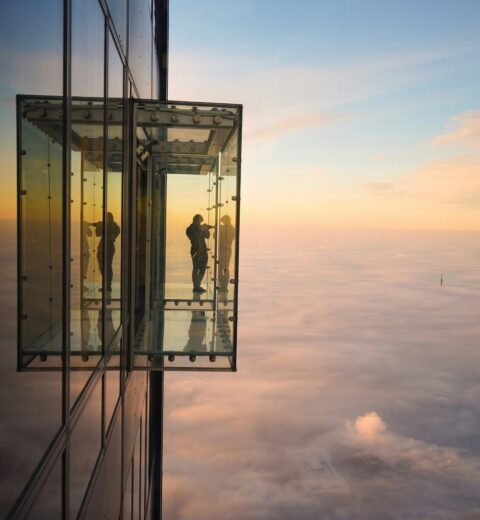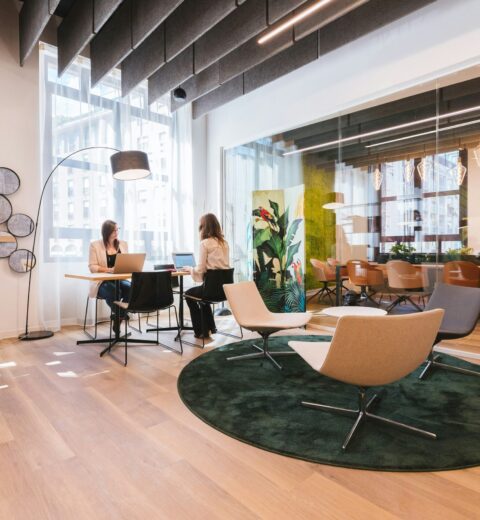A Space for More Than Coworking :: An Interview with Jonathan Read @ Tobacco Dock
Week 11 – London. This week’s post in the Workplace Series is presenting eOffice founder Pier Paolo Mucelli’s interview with Jonathan Read. Jonathan is the founder and director of The Dock, which is the accelerator and coworking space within Tobacco Dock located in East London.

Let us start with the story behind their short, but inspiring journey:
Can you please tell us more about Tobacco Dock; how was it born and how did you start? Pier asks.
And so, Jonathan goes back to the beginning: “So, my business partner Patrick Donovan and I first came across Tobacco Dock as a part of a destination branding project when we were approached by a freeholder in 2010. At this time, News International was moving out of Fortress Wapping, and the owners of Tobacco Dock wanted to get in early in order to create a destination brand before the site was sold off for redevelopment. We came to recce the client’s holdings and realised that there were actually no plans nor ideas of what to do with the Tobacco Dock building.”
“Therefore, Patrick and I, with our events, branding, and marketing backgrounds, got very excited by the opportunity to relaunch and re-purpose the building. Tobacco had been left untouched for 25 years, but even in the heights of a recession, we saw its potential as a venue for events. In fact, even back in 2010, London was short of large-scale events venues, so we put together a proposal for the whole building.”
“Two years later we got a call,” Jonathan continues. “At this point, we had put Tobacco Dock very much at the back of our minds, but on this day in March 2012, the owners called and asked if it was too late to get any events due to the demand from the London Olympics. We emphasized that the proposal from two years previously made it clear that it was essential to act right away and that activations around the Olympics had all been signed months or years previously. Anyway, the owners were still interested in the proposal, so we agreed to test the appetite for it. We commissioned some more research, negotiated a deal with London Film Week and, in October 2012, we finally launched the event space upstairs. Since then, we have been growing 50% year on year. Additionally, in our co-working spaces and private offices we have over 120 scaling businesses based here.”

Pier continues the interview and asks: Jonathan, can you please go a little bit more into detail about the main parts of the space?
“Well, it is a huge building of over 300 000 sq ft, gross. On the ground level are the majority of the event spaces which have natural daylight and 4.5 metre heights to the underside of the beams, which creates is a fantastic areas for event and brand activations. Downstairs, we currently have 40,000 sq ft of coworking space that has been developed and includes desk space, private offices, meeting rooms, and food and beverage offerings. This area will grow to over 50 000 sq ft by January 2017, which then comprises of 25 000 sq ft of coworking space and the rest private offices ranging from 6 to 50 people. When it comes to meeting space, we have seven meeting rooms ranging from 8 to 50 people and, in January, we will add further four meeting rooms. In addition, we have our own clubhouse and space for some other things that gradually could come in action, such as an art gallery and potentially visitor attractions.”
And how do you manage your own branding, Tobacco Dock, with the client’s brandings? Pier continues.
Jonathan replies: “So, I guess we are at an advantage because have our own branding consultancy. We created the brand for the Tobacco Dock and The Dock, and we have grown them out since then. In fact, all of our marketing communication collateral is designed internally together with our online presence. Our interiors team also created all the office spaces and Dock Street bar & kitchen.”

Moving on to discussing the members, Pier asks: From what sector are your typical members?
“We attract a real diversity here,” Jonathan starts and then says: “We always thought that we would attract those really specialised huddles forming here because we do a lot of gaming events upstairs that attracts a lot of overall tech businesses. As a matter of fact, we have got a couple of dozen fin-tech businesses, med-tech businesses, some logistics tech businesses such as Henchman, and even some gaming studios that are based here and a number of non-profits doing amazing things. So, we have a strong mix. It is interesting to see whether that diversity changes over time.”
“In my opinion, the range of sectors here is fantastic and I think that businesses at The Dock see the real benefits of having diversity. It is amazing how many eureka moments you see happening when someone with a particular challenge manages to develop a product that solves exactly that problem. Also, you get completely different businesses that become complementary in terms of buying each other’s products and services and investing in each other’s businesses.”

And how do you facilitate these processes? Pier asks.
“So, it is a combination of the formal and the informal. We run a whole program of events here that are specifically related to the community, whether it is getting advice on IP protection or accountancy or legal aspects, HR hiring or other practical stuff. We also have a share of fundraising advisory meetings, and then it is a whole social program that we run. There we do simple things like quiz nights in the clubhouse, we have lunch-and-learn events, book launches, wellbeing classes, outside speakers coming in and presenting on subjects such as stress management, how to write a business plan, and so on. People love being together. They can have a beer with somebody and it might be entirely social, or they can be attending an event together that will them solve a problem that they both have.”

We are curious to know more about the way people use the space and Pier asks: Since you started, have you noticed any changes or trends in the way your clients are using the space?
Jonathan explains: “The coworking space was originally launched in June 2015, so that is even younger than the event space. At this time, we worked closely with John Harthorne, the CEO of MassChallenge, and they took the initial 150 out of 280 desk spaces. This way they added scale, an events program, and a vibrancy to The Dock, in which was the beginning of the community here.”
“This decision certainly made our lives easier because it resulted in an attraction of the kind of businesses that wanted to co-exist alongside MassChallenge. At the same time, it affected our decision in keeping an open planned coworking space. We now see that there has been a real demand for space from the businesses coming out of MassChallenge, to a certain extent, and also a rush for a private office space for those who have gone through additional funding and scaled up.”
“The startups love being here. This is where their businesses have always been based; they love the community and the support they get, and so they want to carry on growing here. In fact, this is the main change we have noticed because we have a lot of private office space here, and it is not just that businesses can now go from having four desks to a six person’s office, but you can go from having 10 desks to a 50-person private office. So, what we see is that our tenants tend to stay and grow here with us, and I think that in some ways, that is what sets The Dock apart from other co-working spaces.”

Moving on to a different aspect, Pier asks about their main competition in the market in terms of being a huge event space:
Jonathan replies that it really depends on the style of event. “In fact, with some venues such as ExCel we are more partners than competitors. We have also benefitted from organisers moving existing shows from West to East London and also events that outgrow venues – we receive lots of demand from events needing additional space that have previously been in The Brewery, Old Truman Brewery or Old Billingsgate. We also get organic sector growth. For instance, we have moved a lot of wine shows here as a result of securing the Decanter World Wine Awards judging, and now host The Real Wine Show, Wines from Spain, Wines from South Africa and others. Our largest growth, howver, has been from the tech sector, partly because of The Dock but also our location close to Tech City.”
“When viewing the whole picture of conferences, shows, launches and events like that, we see that there is a big competitor set in London. On the other hand, if we view the competition based on the scale of what we can do, specifically the competition between big spaces that can accommodate 1500 for a conference, there are probably 8 main players in London, and we are certainly one of top ten venues in London now.”

The interview continues and Pier asks:
So, Jonathan, what are the main challenges and opportunities you see ahead?
And Jonathan replies “I think the main opportunity and challenge for us, is to stay an interesting and vibrant community that offers the opportunity for people to scale. We will certainly help the startups along their way, invest in some of the businesses here, and connect them to our network in order to raise capital and receive funding. Keeping it vibrant and having the opportunity for people to take an idea from the beginning to a scaling business, without having to move somewhere else, that’s a great opportunity and main focus for us.”
“Another key strand of our growth plan is continuing to connect our event space upstairs with our coworking space in terms of how we can incorporate the businesses downstairs into events upstairs. To illustrate, we are giving opportunities to food start-up businesses to cater upstairs, and we have applied technology to our business that has been developed here. So, there are lots of opportunities for overlap.”
“On a bigger scale, we are still waiting to see what is happening with Brexit. We have had short-term benefits in terms of overseas clients agreeing to pay more of the hire fees up front, which is good for our cashflow. Although, whether London will retain its position as the main business place in Europe, we will wait and see.”

The interview is coming to an end and Pier says:
So, over to my last question; how do you see the market developing within the next 5 to 10 years?
Jonathan explains that he believes Brexit has a bearing on the demand. At the moment, there is clearly a demand for the flexibility that coworking provides, and the demand will continue for the next couple of years. “I think that we are rapidly reaching saturation point in terms of coworking offerings in London. Then it is up to those who operate the spaces to clearly differentiate themselves from the competition.”
“There are some fantastic operators out there who are particularly good at either the sectors they attract or how they run their buildings. Here at The Tobacco Dock, it is unique because of the combination of coworking space and the massive event space for up to 10 000 people. In addition, we are unique because we have a grade one listed building that by itself adds value and attractiveness to the people working here.”
Thank you for the great hospitality Jonathan Read and Tobacco Dock!
Join us next week for an interview with Jane Campbell, General Manager at Rainmaking Loft.




